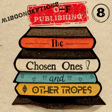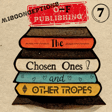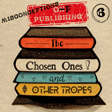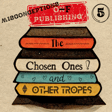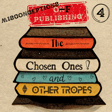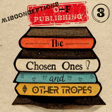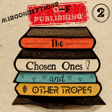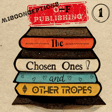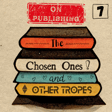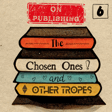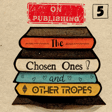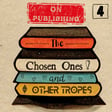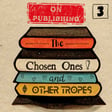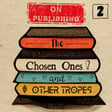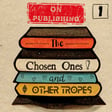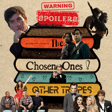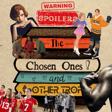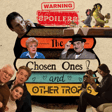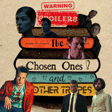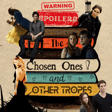Become a Creator today!Start creating today - Share your story with the world!
Start for free
00:00:00
00:00:01

S4.E8 - Children's Publishing ft. Philip Kavvadias
Middle grade author, Philip Kavvadias is here to chat about some of the publishing myths and struggles within children's books.
- Naomi Gibson, author of Every Line of You, Game Over Girl
- Melissa Welliver, author of The Undying Tower, My Love Life and the Apocalypse, Soulmates and Other Ways to Die
- Jamie Greenwood, creator & host of the Write and Wrong Podcast
Transcript
Introduction and Icebreaker Game
00:00:00
Speaker
Do you reckon Christian Grey is different characters? Whoa! You had it here first. I'm just finished After every episode was like, oh my gosh, I'm so angry at these toxic characters. Like, she'll have more food in my mouth across the next episode. Because I loved it, but obviously I hate it. This is so much fun. Because this is it my Malfoy Hermione family. Yes! She shouldn't have done that. I'm trying to make Neville happen. It's too wholesome. Sorry.
00:00:33
Speaker
We have a new tradition of starting all of these with a fun little icebreaker. It's not fun. It's really fun for me. For you, you know the answer. Exactly.
00:00:45
Speaker
um i'll do I'll do an easy one. You guys should get this very, very quickly, but that was a funny one. Basically, I find one-star reviews online for famous pieces of work, and then these two try and guess what it is. um And I have varying degrees of difficulty, but we'll do an easy one for now so that we can get into the podcast. ah Here it is. Writing this was a crime, and reading it was a punishment. Was it crime and punishment? It was crime and punishment.
00:01:15
Speaker
Incredible review. Six sinks, straight to the point. That's pretty clever. That's quite witty really, isn't it? I quite like that. It was. I want to read their book. You can have a point.
Exploring Children's Publishing with Philip Covadias
00:01:29
Speaker
Um, so for this episode, this is going to be a sort of fun bonus episode, uh, towards the end of the, of the season, um, featuring the one and only Philip Covadias. Uh, Philip is a, for anyone listening, Philip is a children's author. Uh, the second book in his mission series, uh, mission manta ray came out at the very start of the year. So we thought it would be fun to do an episode focusing on children's publishing specifically.
00:01:54
Speaker
So as per, we'll we'll get Philip, Melissa and Naomi to all choose ah a myth or a trope around publishing and to bring some podcasts and then we'll we'll chat about it. So without any further ado, let's kick things off. I thought we'd start with, ah we'll save Philip till last. So I thought we'd start with Naomi. Naomi, what was your publishing myth for today?
00:02:19
Speaker
Uh, my publishing myth was that it's easy to write a children's book. Oh, that's true. Okay. And a bit moving on. So easy. That was it. Yeah. We debunked it. yeah And as you said, we're probably including YA is generally concluded within children's for this. YA and down. Yeah. Yeah. Sure.
00:02:41
Speaker
and So yeah, I think it's quite actually a widely conceived ah myth that children's books are simple or less complicated. They don't require as much work or as much thought to go into them. You know, everybody knows a kid and as an adult, you might read a a book to a kid. and Uh, you're like, I could do this too. This is so easy. Um, and then of course, you know, they might try to go away and do it and then they actually can't. And they might actually realize that actually, no, it does take quite a lot of time. Um, but yeah. And, um, and that's my point really, I suppose, trying to de- debunk this is that, um, ah middle grade and YA books in particular tackle quite a wide range of issues, uh, that a lot of kids are going through. And I think children.
00:03:30
Speaker
particularly know when they're being talked down to. They're quite shrewd and they won't waste their time on something if it's not if they're not interested in it basically. So to try and captivating an audience like that is actually a very hard thing to do because an adult who goes away and buys a book might think, oh, I've paid for it. I guess I'll carry on reading it if it if they're not interested in it. Whereas a kid will absolutely put it down if they're not interested in page one, probably. So it's quite tricky to engage a child like that, but also
00:04:07
Speaker
The
Challenges in Writing for Children
00:04:08
Speaker
children's books do all the same things that adults books do and I don't think that's really appreciated um very often is the fact that you have strong characters, you have to have an engaging plot, you have to write well.
00:04:19
Speaker
And you have to have a good voice. I think the voice that you would use for your children's book is actually harder than what it might be for an adult book. Um, like what we were just talking about before, uh, the thing like the the word choices that you're going to use are probably going to be quite a lot different. Um, yeah at the same time, like I was saying, you can't talk down to a kid because they'll, they'll recognize it straight away. You've got to sort of talk up to them or be at least at that level. It's really, it's quite tricky thing to do.
00:04:46
Speaker
Yeah, I tell you, because in some ways you have a more narrow path to walk down. Like you said, with the language choices, you can't use certain words if you're describing an action scene, there's a certain level of violence that you're not allowed to talk about.
00:05:04
Speaker
You have a responsibility as an adult and you are aiming it as a child, which I do totally accept, even if sometimes it feels like the lines are blurry or they're overstepping saying, no, you can't possibly use this. I do understand that there is a responsibility to a child to make sure that they're in a safe environment.
The Impact of Digital Media on Children's Books
00:05:22
Speaker
What's reading?
00:05:24
Speaker
So I do understand why that. And also there's obviously um gatekeepers that you have to get passed as well. So when you're selling to an adult, it's true then you're writing a book and an adult buys and reads the book, like that's it. Whereas, you know, with, with, especially the same middle grade, you've got teachers, you've got librarians who are recommending it to parents and grandparents and aunties and uncles who are buying the books for the child or helping at the library to pick out those books for the child. it isn't necessarily that they're choosing or that they're in charge of the money to buy the book. So there's so many more gatekeepers to get past as well. So I do understand that there's a lot more responsibility and you have to think more when you're you know sort of pacing out the whole book, language, content, et cetera. Yeah, for sure. I do think it's incredibly difficult to to write it. Well, I can only talk about and middle grade, which is my area. It's very difficult to write a middle grade that kids will
00:06:19
Speaker
actually love with a passion and because it's it's difficult to um compete with the what they use for to satisfy their their storytelling needs, let's say. so they you know It's gaming, it's movies, it's and a lot of digital stuff. and To compete with that,
00:06:47
Speaker
and It's more difficult, I think, than writing for adults because adults usually and grew up without all that and they are more used to getting their storytelling from books. Kids are more used to getting their storytelling from other means.
00:07:07
Speaker
That's a really good point actually. I think adults are also more mindful of what is, I don't want to say like better for them, but like, like healthy. There's something sort of intrinsically healthy and mindful about, for me at least, like reading a book versus watching a movie. Like I feel like I get more out of it. There's like a level of willpower coming in. Exactly. Yeah. And the kind of want to do it. Whereas I totally understand, you know,
00:07:33
Speaker
Fortnite appeals to and kids on so many levels that a book, a single book could never compete with. And Fortnite is free. Oh, that's a good point. I never thought about that. Yeah. And I think it's ah it's probably um when people say it's easier, they might mean that you can write one quicker. For example, if you're writing picture books, you can you know generate five five ideas in a day.
00:08:03
Speaker
and and you know create a first draft of five of your ideas within a day. and But that doesn't mean, so it's quicker, but it doesn't mean that it's easier to capture someone, you know, to write a good pixie book that will capture a child's attention.
00:08:23
Speaker
who And i picture books from what I've heard is one of the most difficult ah books to get to a
Market Dynamics in Children's Publishing
00:08:31
Speaker
publisher. It's a very oversubscribed, it's also largely saturated by previously established authors. yeah um There's also, was this I so um who was talking to about this, but ah in libraries, I think picture books are some of the most borrowed books from libraries because obviously you can go through them pretty quick with a child so it makes sense to you know borrow a picture book have it for a week or whatever take it back get a new one yeah rinse and repeat so it's it's a more challenging prospect for a publisher to to to do that kind of thing and going back to what you just said uh phillip about um i had a thought about this and i'm blanking on it now um what was i gonna say
00:09:20
Speaker
was it was it about see um When Melissa was talking about earlier that is you know the the market, which is also what I want to talk about, today with that the market for children's books is not always children.
00:09:35
Speaker
right Yeah. um Yeah, that's true. I think there's a good chunk of YA readership that are over 20, isn't there? That's true, actually, as well as the gatekeepers. You've got people reading YA that are older and the number of blessed goodreads reviews, which obviously I'm super thankful for, that say, oh, I really love this. I love the concept, but it was a bit young. I'm a bit old for this.
00:10:00
Speaker
yeah Really? Do you think so? I didn't say she was married and then you turned up and she was 15. I think I did. I don't know a lot about YA, but I did read that it's that it's it there is a statistic to say how many YA will go up percentage is actually enjoyed by grownups. right And i I don't know, you guys probably know that better. Is it something like 20% or 25%?
00:10:29
Speaker
It's almost 30 actually. yeah Yeah, it's more than you expect. yeah But it's the same people that grew up when YA sort of first became its own thing, yeah which I imagine would have probably not been that long ago. It's the people that grew up who were who were the age and have kept reading that same thing hu as they've gotten older.
Complexity in Children's Books vs. Adult Books
00:10:50
Speaker
Make me. me basis It's us millennials. I remembered what my point was. um It was, ah you were saying, that obviously this whole thing is, writing for kids is easier than than writing for adults. That's kind of the crux of this. And that is a preconception I think a lot of people have. And I think if you look at it from the other direction, it's because some people coming into publishing
00:11:13
Speaker
approach it from a point of view of, um well, if I write for adults, it has to be literary fiction, you know, it has to be very, yeah oh it has to be like highbrow stuff. And it really doesn't, you know, there's, yeah there are children's, there are plenty of children's books that are 100 times better written than lots of adult books, yeah in terms of the craft and the prose and how it's like put together. And I think that's, that's something that People outside of publishing will look at it and and think, oh, adult books are all super smart and like clinically well written. And it's like, that's not necessarily the case at all. There are poorly written adult books as there are poorly written kids books. There's no distinction.
00:11:52
Speaker
exactly
00:11:56
Speaker
Anything else to say on that one?
Celebrity Influence in Children's Publishing: Myth or Reality?
00:11:59
Speaker
um I think, well, one extra thing, if you're thinking of trad publishing with children's books, and is it easier? Not only easier to write, people think, I think a lot of people think, as you were saying, Jamie, like people worry, oh, it's not literary enough. not This isn't what I studied at university level, so it can't be good enough to be an adult book.
00:12:18
Speaker
um I think you also get that with publishing. ah People just don't realise that in children's publishing, there are like a very small percentage compared to how many adult publishers there are. And this is a smaller market because there's less children and children apparently have started to hate to read, but I'm sure we'll talk about that in a bit. And I know Phillip definitely has some opinions on that what we can do to get kids reading. But you know, there's all this other stuff pulling away. So it's definitely there are less readers within the children's market than there are the adult market.
00:12:48
Speaker
So yeah, from a traditional perspective as well, it is definitely harder. There are less agents, there are less publishers, there's less audience. So it's not necessarily you see all this money. Like, oh, it's going to be so much money. It's going to be so easy to get into children's publishing. I would say it's a lot more competitive because of that.
00:13:05
Speaker
Yeah. And adding on to that as well, parents often, you know, for parents trying to encourage their child to read, it might be but that they also, you know, are a fan of reading something that they do. They want their children a lot of the time to read the books that they read as a child, as a child. Yeah. And obviously those have already been written classics. Exactly. Yeah.
00:13:26
Speaker
it's It's weird because obviously the adult market is in the same situation. Like there are more, I was talking about this on the Right and Wrong podcast the other day, there are more books that have already been written and published than you'll be able to read in a lifetime. no So any book that comes out and needs to modernize something or like have a new take or like say something new.
00:13:46
Speaker
And I think there's an issue with children's where it's very, it's it's kind of hard for publishers to take something on that is new because they don't know how successful it's going to be. So there is a lot of just recycling the old stuff and kind of redoing the old stuff or revisiting the old stuff, which makes it harder to break in as a new author. Yeah, no, I totally agree. So that's definitely wrong. It is not easier to write a children's book. It's absolutely not. But you think it's harder.
00:14:17
Speaker
I would say the publishing side of it, I think is almost certainly harder. I think that's that's very there's less opportunity and there's less money in children's than there is in adult publishing.
00:14:29
Speaker
um but that segues us very nicely into Melissa, because I know which myth you have brought with you. Tell us what it is. I was trying to remember how I phrased this, but it's essentially that ah celebrities, you have to be celebrities to sell a children's book.
00:14:50
Speaker
So obviously see we hear all the time. So there's two types of celebrities I was thinking about with this point, right? There are celebrities like um David Walliams or um Tom Fletcher. He's got that dinosaur series that's really popular, et cetera.
00:15:06
Speaker
And then there are so like celebrities in, they have done something else and then they have entered the children's publishing arena. We will not be discussing whether they write their own books today. We will leave that very far away on the legal table. and But yeah, so they come into the children's arena and it almost feels like when a celebrity brings out a fragrance or something to writers, it feels a bit like, okay, you've just entered this thing. I knew Naomi would pick up on that because I know you'll be going with fragrances.
00:15:30
Speaker
So it feels sometimes like they've just like appeared out of nowhere and they don't really, you know, this is someone else's dream job and you just kind of waltzed in. And then the other type of celebrity is, well, I say celebrity loosely, and it's the thing of having a big following online. So, yeah you know, we see a lot of, especially in the YA space, we're seeing a lot of TikTokers who've built up a large platform online and then have written or were always writing, because they're part of the book community, let's say, um a book and it's come out. So,
00:16:00
Speaker
Yeah, essentially I was trying to sort of think to myself whether this myth is true. So I had a quick look at the last couple of weeks and also the 2024 bestsellers in the yeah UK. I've got an access pass for the bookseller, which if anyone doesn't know is like ah an industry magazine um that you can have a look at. And they ah they print the numbers of books sold each week in the top 20 for each book.
00:16:24
Speaker
And I had a quick look and actually in the top 20 for the last couple of weeks and indeed for the whole year last year, there were only really three or four celebrity names. So you could argue that there were three or four celebrities and everyone else was a quote unquote original author. So they didn't have like another outlet before they came into publishing. It was um David Walliams. It was Tom Fletcher. And then the other ones were quite big, ah you know, ah names in children's publishing. It was like, say, like the Lottie Brooks series was up there. and Dave Pilkey was up there. and Jamie Smart with some graphic novels, that kind of stuff. So it wasn't anything unusual. And these were like, obviously, the big sellers of the year. And indeed, the last couple of weeks, because it's been Christmas, they are the big sellers that that it pretty much reflects the entirety of last year was on the top 20.
00:17:09
Speaker
and So you could argue that you don't have to be a celebrity to sell a children's book. And there's also been, which I will not name again, and there's been celebrity books that have come out that have not necessarily done well.
00:17:20
Speaker
um and have not sold well and maybe they were given a big chunk of money but not necessarily marketed because I suppose there might be a thing with celebrities where you've already got a following so I don't need to put marketing into this. So there's there is an argument you don't have to be a celebrity. um And then in that top 20 there were also people from TikTok. So I'm thinking like Lauren Roberts for Powerless was a huge book last year and also the sequel came out.
00:17:46
Speaker
um I know she started on TikTok and um I know Bill Wood's book came out and Let's Split Up and he started on TikTok. I find the big difference with a lot of these is when I look into them. um These are people who are part of the bookish community and have usually been writing for years.
00:18:02
Speaker
um They are not people coming from a completely, I think there's a misconception they're coming from a completely different platform. Like they're just some famous person who makes daily vlogs and then they write a book. A lot of the ones that are the YA TikTok books, not that at all. They are usually writers that have been bri trying to break in for a long time and also supporting other people in the book community and have built a community themselves around that and have a hundred thousand followers or so, and then break into publishing, which isn't necessarily a bad thing.
00:18:32
Speaker
Um, in fact, I think it's probably a pretty good thing because they, elder like people who um, Rosie Talbot exactly Rosie Talbot example. Yeah, exactly. So, um, I think sometimes as it that gets a bit of bad press, which is really unfair because these are actually people who love books and love writing.
00:18:47
Speaker
And so not really include us. So that's why I decided not to really include them in my pitch. Although I will say for obvious reasons, publishers will always ask if you have a following when you're on submission. Like, of course they will, because it will be stupid for them not to utilize an avenue. If you do have 150,000 followers on TikTok, it would be idiotic to ignore that.
00:19:09
Speaker
like if you've written a good book anyway and you've got 150 brilliant then you've got you know a ready-made audience so I turned in somewhere that's coming from um however on the flip side now I've tried to be nice too so I've separated out TikTok people and I'm focusing on celebrities on the flip side the reason you hear all of those children's authors skryke and skryke whenever we have it's like oh Oh, this celebrity has been given a book deal. I think the big one last year possibly was Keira Knightley announced some book deal. I think it was the most she read article on the bookseller on in the top 10. A lot of people were talking about it. And this is absolutely, I have not read Keira Knightley's writing. She might be the best writer ever in the history of the world. I have no idea because it doesn't actually matter for my argument whether she's good or not.
00:19:56
Speaker
The issue we have is children's writers who are celebrities who come into the arena get given huge marketing plans because of who they are and they also get the given the big flashy deals that helps launch that because of course you know six seven-figure deal wow it must be an amazing book.
00:20:14
Speaker
They've got agents that will negotiate those sorts of fees because they're used to higher fees because they do XYZ, they were a footballer. Let's say that's an arena where they get paid a lot of money. There are footballers in children's publishing, etc. So it isn't actually necessarily that we're complaining because we think their books are rubbish or anything like that.
00:20:31
Speaker
We're moaning about it because we put in so much effort to try and get our books noticed and seen. And it feels like those spots are taken by celebrities who sometimes aren't even that fussed about the book being out there. And I think that's where it comes from.
00:20:48
Speaker
it's not necessarily and they're all different celebrities and I know like friends I know Doma O'Leary talks a lot about other um children's writers on his platform and he does support other children's writers on his platform it would be great for instance if all celebrities who release in the children's arena could maybe talk about other children's books they've read that would be awesome.
00:21:05
Speaker
or maybe just retweet a couple of children's authors to help give them that platform. Because I think think the thing that we worry about is, yeah, the top 20 doesn't necessarily have loads of celebrities in. But in order to make a living as an author, you don't need to get into the top 20 every single week to make a decent living as an author. And those slots are being taken up by celebrity books that are getting this huge push and not necessarily making back the money, actually.
00:21:30
Speaker
Because you do need to sell quite a lot to make back six, seven figure advances. And it's pushing out a lot of authors in the middle, I think, and near the bottom that could be higher up. I'd imagine a lot of them are not making paying out their advances and not even close. No, I mean, that's just generally speaking anyway, nevermind with celebrities where it's going to be huge numbers.
00:21:51
Speaker
But I think the celebrity bothered if they out-earn their advance or not. yeah right It's not really their concern. They're just doing it. No, that it's not their only form of income. It's not their only form of income. That's the other issue. Whereas it for a lot of us authors, it is our only form of income. We're trying to get a size of an ever diminishing pie.
00:22:12
Speaker
And that is where we feel pushed out. And it feels annoying as if someone just waltzes in when you spent years trying to build up an audience for something. And it also creates it creates the wrong impression that we were talking about earlier, that it's easy to write the Tillis book, because whenever someone gets some sort of and ah Fame or marketability or they're well-known they want to capitalize on that by writing a book and no one ever publishes it an adult book and then that actually and Makes people think well, it's easy to write this book, you know, that everyone's doing yes yeah um Very true and isn't that funny how a lot of them don't go into the fat arena interesting Yes might actually be proving exactly what you're saying Philip the opposite
00:22:59
Speaker
Yeah. And i I mean, another reason is that there's no really and a review culture in children's book. I think other people have talked about that as well. And and you know you and if they go into the adult arena,
00:23:15
Speaker
the book is reviewed and it's found that it's not very good, or it's in reviewed properly, um it will be more difficult. and But with um children's books, there's no so much reviewing, if you know what I mean. I mean, it yeah it it exists, but everyone's and kind of, can I say, ah very kind to each other when they're reviewing children's books. And they're not as kind when they're reviewing adulthood.
00:23:46
Speaker
that' say true yeah That's That's funny. I think that there's a distinction, or like I try to look at it in terms of like, if I see it come out, because at the same time, you know, devil's advocate, just because you have become famously successful in a different field, doesn't mean that, you know, this person hasn't always wanted to write a children's novel, you know, they shouldn't be exempt from being able to do it because of that thing. Yeah, I agree with that. That might be great writers. Yeah.
00:24:14
Speaker
Exactly. Right. But the question I was asking is like, does this book exist because the celebrity wanted to write it or does it exist because a publisher or a marketing manager or part of their merchandising team approached them and said, Oh, this could be a good opportunity to like sell more stuff. Yes, which you hear about a lot actually, like it celebrities will say, I was approached by this publisher and we decided to put a book together with each other. And this is where, like I was saying about sort of people with big followings online. I do think it's different because a lot of these say TikTok books, which people love to poopoo, I think when you say TikTok books, like, oh, it's only famous because it's on TikTok. Well, it's probably because it's popular because a lot of people are reading it.
00:24:57
Speaker
um ah Yeah, these TikTok people who are coming through with their book deals, they've just found a slightly and less traditional way in. And that's not a problem. And as I say, a lot of them are big readers. That's kind of what their entire platform is built on. So yeah, I have no issue. And you know, sometimes, so for instance, if you take say, um I know it's an adult, but in Richard Osman's books, he's been writing for years, obviously, because he and he clearly writes his books. And he's been writing for a long time because he writes scripts for various things. He's been pitching television shows for a long time. and So that is his forte. It's his arena. I totally understand why he has entered the arena. However, also did his name help accumulate sales? Of course it did. And it was stupid not to use that. Again, I totally understand that. But it's in a different way to some other celebrities coming in. And as you say, especially the ones that are approached.
00:25:46
Speaker
Yeah, yeah.
Marketing Strategies in Children's Literature
00:25:47
Speaker
To say that him being on Pointless is the reason for the success of his books would be would be a a wild accusation. Yeah, yeah, yeah. One thing I want to say about that, James, is that the the you made the point, and Melissa, that you know why are they not supporting other people? I think that's a great point. They're not involved in the community. No, they're not, not like the Tiktokers are.
00:26:14
Speaker
and know I'm also a bit worried if celebrities are starting supporting people because what will happen, I think, is all the PR and marketeers from publishers will then use those celebrities as for publicity, and then perhaps the gap between books that are properly marketed by suppli by publishers and the ones that are not marketed so much will become even bigger. who Potentially. that obviously there's a that i mean I think there's dangers wherever you look at it when it comes to influence from celebrities.
00:26:55
Speaker
Cause you can look at like, um, I've had a few authors on who have been picks for Reese Witherspoon's book club. And essentially if your, you know, if your book is picked for her book club, it's almost certainly going to become a bestseller. That's, that's just how big and influential that book club is. But then it's, you know, there's like you're saying, Phillip, it's like, there's a, there's a sort of.
00:27:21
Speaker
good there's a good and bad. It's a double-edged sword, right? Because it's like, well, that's a lot of influence that her and her team have over yeah whether ah you know a book is a commercial success or not. Yeah. and And you can see PR people fighting tooth and nail to get a book and to raise withers friends. And it will be the same way if celebrities start endorsing books.
00:27:43
Speaker
And this, you know, all the whole PR machine will fall upon them to, you know, from promote the books they want to promote. Yeah, yeah. Which, ah yeah, like Melissa was saying about the the people who have sort of become large on social media and then gone through that. And like, I've spoken to a couple of people. I had um Cameron Coppello on who a while ago, she basically became very big on book talk and then uh started posting sort of her own writing on and then was approached to write a novel off the back of that okay but she's so open about like yeah she's like this novel never would have happened if it wasn't for her like community on TikTok exactly yeah that's the big difference i think a lot of people just pish posh and push pass they don't like to admit so yeah that's a completely different scenario
00:28:32
Speaker
to a celebrity completely outside of publishing coming in, collecting their check and then not really caring about anyone else in the community, not caring about pushing up any other books. It's just no, it's a big no. Do not like.
00:28:48
Speaker
Yeah. And, um, is it like we were saying that you never see, you rarely see this kind of thing in the adult space. Um, ah there's exceptions. I think Tom Hanks writes fiction. Yeah. Uh, Luke Arnold writes fantasy. I think wrote an adult, but it didn't do very well. Question mark, okay but yeah.
00:29:06
Speaker
and um oh it didn't Millie Bobby Brown wrote something. Oh yes she did, that's true. It was that she definitely wrote. Why though? Based on her grammar? Question mark maybe? Yeah I don't know it seemed like a strange book for her to have written um but what I was going to say is the reason it doesn't happen in adult also is because uh I think if it is that other situation where a sort of um a merchandise team has come to the celebrity and said, we have a merchandising opportunity. right They just do an autobiography or a biography. Because it's like, I'm a celebrity. People will buy this because of me. It may as well just be a book about me. Yeah. And put my face on it. Yeah. Yeah. And Waterstones will easily put it on the front table as you come in, because, you know, people know that person.
00:29:52
Speaker
Yeah, I don't have an issue with that. You know, if they want to do a biography and people want to buy it, that's fine. Well, that was I think I feel that we covered that. Was there anything else anyone wanted to add before we move on to Philip? No, I don't think so. I think. No, we nailed it. It's done. There's nothing more to say about that. There's nothing else that we can end the conversation on celebrity children's books right here, right now. You don't have to be a celebrity. Is it helpful? Yes.
00:30:20
Speaker
Yes, exactly. yeah Obviously, it's untrue that you have like anyone can sell into the children's, but if you have a big following online or if you are a celebrity, of course, it helps. Yes, absolutely, it helps. Okay, awesome. So, Philip, what ah what myth or trope about publishing have you brought for us today?
00:30:40
Speaker
So similar to what we were just discussing, the trope I will talk about is that the market for children's books is and mainly children.
00:30:55
Speaker
I think we already talk about YA, how almost 30% of it is read by grownups. um But I think that you can, for middle grade, which is what I write, I think you can ah classify books as children's books, middle grade books that are primarily for middle graders, and middle grade books that are primarily for grownups. Some grownups will read middle grade,
00:31:24
Speaker
But what I'm trying to say there is that that there are quite a few middle grade groups that are produced to appeal to grownups. So the covers are there to appeal to grownups, the stories they choose to tell, the writing style. um And this is, um you know, for parents.
00:31:43
Speaker
um And by the way, this is not not a i mean this happens with all children's products, with toys, with clothes. they you know There's a huge effort to also appeal to two parents. But yeah, I think there's ah there's a there's there's big sizable market in middle grade of books that are primarily written for grownups. Yeah. i I can see that because it's, and I've talked to, I don't think we've probably talked about this at some point on the progress before, but it's middle grade. This is where kind of YA sort of sits aside from the rest of children's because middle grade and younger, the, the reader more often than not is not the purchaser yes yeah of the product. So yeah, the thing that you're, you're highlighting here at Phillip is that
00:32:34
Speaker
people, you know, some books are written for the parent so that the parent can buy it and say, oh, I think this will be really good. You'll probably enjoy this, but not necessarily wondering if the the child would would enjoy it. yeah i think there's Yeah, I think there's a number of books that as you say, about because the parent thinks this you know this will appeal, or my child should read something like that. right yeah and i mean I remember on and ah on another type of product, when when my kids were younger, and there was a lot of advertising about
00:33:13
Speaker
getting ah games or kids to help your your kids yeah learn coding. So coding was very popular. And all parents, including myself, thought, oh, yes, definitely. My kids need to learn coding because it's going to be an important skill when they grow up. And there was a big market for for that. And I don't think um kids were ever really interested in in those. ah But parents were thinking that this is essential for their future. Yeah, yeah, that totally makes sense. And also like threads into the celebrity thing.
Shifting Reading Habits Among Children
00:33:53
Speaker
So I was thinking, like, you think of the sorts of celebrities that write these books, and that often the ones, especially the ones that are approached, ah people who they think, oh, this person is a favorite celebrity of people who are parent age,
00:34:06
Speaker
and have children. So it makes me think of, them you were saying about like products aimed at adults, Philip. I was thinking about the Alexander Armstrong book that came out last year, Eve before. It had um a very particular cover and I think it's called The Golden Linnet. And I am a fully grown adult and had to Google what a Linnet is. Can't actually remember.
00:34:27
Speaker
and And so I thought to myself, is this, I mean, maybe it did really well. I don't know, actually, I didn't spot it on the top 20 thing I was looking at recently. Maybe it did really well. But I did think it felt aimed at adults. It felt more adult aimed and it's a middle grade magical book and it did not feel, and they Alexander Armstrong's name is at the very top, quite big. And I just thought this is aimed at a particular age of adult with children.
00:34:53
Speaker
but there there's There is, I mean, you can you can see them on the bookshop tables. that they they are the There are books, ah quite a few of them, that they have this whole kind of previous era aesthetic, I suppose. I don't know how to say it. So so and you mean they have an aesthetic of from when we were, well, I was a kid, for example. So when parents were kids and and they,
00:35:22
Speaker
And often they have an aesthetic where... It's like, you know the thing where parents, when they have babies, everything is beige. They have beige, the prams and the clothes and they're all monochrome and they all match the house, right? So what I'm trying to say with this is that there's this aesthetic that appeals to parents and that's used a lot in books as well.
00:35:53
Speaker
yeah Yeah, no, I totally agree. Yeah, you're right. The aesthetic the word aesthetic is interesting as well. Those sort of hardback books that come out for kids, there's a lot of money into and they have very particular artwork on the front. Have you guys seen, I feel like what we have absolutely described Matthew McConaughey's children's book.
00:36:16
Speaker
yeah Because because like first of all, I'm thinking like Matthew McConaughey is doing a choice of books. I'm like, who's no teenagers probably don't really know or care about Matthew McConaughey. You know, this is for millennials youngest. Yeah. ah Yeah. And then you you look at the cover and it has this like that kind of what we're describing now, it's a bit of a sort of old timey, I would say old timey, but It reminds me of Calvin Hobbes. It's not what modern children's books look like. yeah i'm I'm really horrified. It's not called all right, all right, all right. And it's Matthew McConnell. They missed a trick. but five and And maybe it's great, but I don't know.
00:36:58
Speaker
It makes you wonder who the actual demographic is. Exactly, right. It's to tell to parents, but like, do children, are children going to like... us Children won't know, like you say, they won't know who Matthew McConaughey is. They they don't um really know who David Williams is. They don't know who Jamie Oliver is. like Parents do and they pick them up in Tesco. It's just crazy.
00:37:17
Speaker
Yeah, it's ah it's like, a and and my theory is that it started when, um it started when kids started moving away from reading, because they have, like I said, I was saying at the beginning, they have all those other sources of storytelling. And, and I think um publishers, and it was the right business decision, you know, they decided to step up a bit the kind of adult oriented children's books.
00:37:47
Speaker
and That might have created a little vicious circle where you know more books for adults are published. they're less appealing to kids. And then, you know, in order to keep the same revenue, they have to publish even more for others. But I don't know you know. We'll never know. We never have any information about, you know, real data in publishing. But it might have been essentially, is what I'm saying, for children's publishers to survive as yeah kids start being and distracted by a whole whole and range of other things.
00:38:28
Speaker
Yeah, it's interesting because I obviously, you know, growing up, I played a lot of video games in my teens and I come kind of stopped reading entirely, I think, in my teens. And it was only in my early twenties that I got back into reading. And I wonder if that could, if people had a similar experience to that.
00:38:49
Speaker
um And that could be why oh older audiences do like YA because if you haven't, you know, I didn't, I didn't think I read a book from the age of like 15 to 20. And if you if you haven't read a book for five years and you're getting back into reading something like YA, which comes in at a much faster pace, it's much easier to sort of hit the ground running with it.
00:39:11
Speaker
could be like an appealing way to sort of get back into reading. And then, you and then you you know, you you like it, so so you you keep reading it. yeah I didn't do that. i I think the name of the wind was the book that got me back into reading, because I'm a big fantasy guy. That drop in reading is um is is particularly accentuated sinceated in boys, I think, when they become teenagers. They drop off completely.
00:39:39
Speaker
um Yeah, that's quite sports and girls. I mean, yeah yeah, that's it. I mean, we who knows? But reading, yeah, they definitely don't read. And, um you know, every year I go to Jalk with my daughter and there's never a boy there. him um But as you say, it's you know And then we come back and later.
The YA and Middle Grade Market Evolution
00:40:08
Speaker
I don't exactly know what's happening. I don't remember. It was a long, long time ago. But yeah, but I understand this complete dropout for Timmy's boys.
00:40:20
Speaker
Yeah, I think when I was a teenager, there was one, and I was at boarding school and there was one other guy, there was one guy in the boarding house who I remember being ah a voracious reader. And I actually like, when I got back into reading, spoke to him and he got loads of recommendations for fantasy of him, but he was like always reading. But yeah yeah, it was one guy out of like the whole boarding house as far as I know. And you wonder, you wonder like as well with marketing, as you were saying about,
00:40:45
Speaker
Is it useful to market to say outside of the usual readership? So if it's a teenage, is it useful to market it towards adults? And then I was thinking about, I scrolled down, I Googled the Matthew McConaughey book and then I just scrolled down and there are, there's a little thing on Google where it's ah it's picked out some reviews, right? And of course that made me realize because the reviews, this is like a, I want to say like upper picture book, lower chapter book. The reviews yeah are not written by the six year old that read it.
00:41:12
Speaker
They say, wow, what an amazing book for young minds. My son is six and he was so happy to know it's OK to make mistakes and he's happy to know he will never be perfect. Thank you so much, Matthew McConaughey. I'm sure he read it ah for the best book to help my son. I really appreciate you. That is an adult connecting with a celebrity that they respect and admire.
00:41:32
Speaker
writing the review for this book, and that's going to generate, I mean, don't get me wrong, I'm sure it's fine, because it's Matthew McConaughey's books, it's already going to generate some revenue, but that's going to generate more clicks, it's going to be up on the SEO, because there's more reviews written, we know how important reviews are to write. So again, I think with children's books, if you're aiming them, the people who are going to be writing the reviews aren't the children anyway, and that's not helpful from a marketing perspective. So surely you are aiming them slightly at adults in some way.
00:41:57
Speaker
I think you have to because the demographic you're selling to don't have their own money. yeah you know The adults like are the ones who are going to buy it for them or they get given pocket money and their pocket money is competing for you know going out and being social with their friends, playing games, buying yeah stuff online or whatever. And it's like, a book is never going to win. no You have to, I think, aim it slightly at an adult. Yeah, it's tricky. Yeah. I mean, maybe it's a necessity. Exactly. um And like I said, I think it was, a I might be wrong, but I think at some point it was definitely a necessity in order to keep a revenue stream as kids, you know, as other things appeared that ah appealed to kids.
00:42:45
Speaker
Yeah. I also wonder, I think would it's possible that there might be more of, I feel like there might be more of a split between MG and YA in the not so long away future, especially with, and we've talked about this at length on this podcast on various episodes, is that YA generally is getting pushed upwards in terms of age. with you've got You've got your crossover and your new adult now, and a lot of YA is sort of being brought up. and and At some point, it might even be it might move out of the sort of children's area and be considered as the kind of lower adult area.
00:43:23
Speaker
yeah because it this is this topic here is like a very dividing line between MG and YA, which historically I don't think has been covered that much. Yeah, yeah I agree. its So there's no is there no YA at Monterey? I don't know YA very well, but is there no YA that's you know, kind of from for young teens, you know, I mean, so not middle graders, but who don't want to read kind of a a essentially covert adult book, you know, in the yeah the form of a YA. Yeah. I mean, they do exist. um they are just There's this thing in publishing where I swear every agent we interview at Wright Mentor says, the wave is coming. They want to do teen. Teen has a couple of issues. And I'm specifically really talking about, and again, teen boys, they really need to aim more there. But and teen girls, especially because they know that's the larger market, they don't really want to be called teen when they're teen.
00:44:24
Speaker
So that's really tricky, how to market the actual title. Because really, and when you're a 13 year old girl, you want to be reading about sex, drugs and rock and roll. You don't want to be considered a teen, you want to be considered an adult. I want to read about Bella getting married and having a weird vampire baby, you know, like, my teens are weird. So I totally understand that, that's really tricky. However, I will say, there's definitely not enough in this space. And um of the top 20 books, including the one sort of last year that I looked at,
00:44:51
Speaker
the Lottie Brooks books. I'm trying to think who the author of the Lottie Brooks books are now. um They did very, very well. I think it's um Katie Kirby. and They did really well. They were sort of right up in the top. And in fact, whenever and one of those is released, and they're very much teen, and they're very much, they remind me of when I was younger, the Angus Thongs and Full Frontal Snogging, Daft Teen books that were very safe.
00:45:15
Speaker
and just, you know, silly, embarrassing things that happen to teenagers and they do really well. And in fact, interestingly, do well at libraries. So I think libraries is probably the only place I can think of where kids who aren't in charge of their own money are choosing their own books.
00:45:31
Speaker
pretty much libraries because they're not spending any money and or they still have to really be taken there. You have to have a parent who's really active and takes them to the library. And then they are choosing what they want because there's no money limit, right? And so they're just pick, and they're in the library. So they have to pick something. If we're going to stay here for an hour, I've got to be entertained. I'll ahll read a book. So it's a little bit different there. But apart from that, it's obviously the books are being bought and people aren't using libraries enough. Yeah. I know that lots of books do well in libraries as well.
00:45:57
Speaker
and So they aren' there's a demand for it. It's just really difficult to know how to market it, I think. yeah They're choosing their books with an asterisk because they're choosing their books under supervision, as in they might choose a book which their parent might then say, no, that's too long for you. Yes, and I know that card librarians try very hard to ne navigate those situations the best way they can.
00:46:19
Speaker
You know, interestingly, um, I've got, I've got it on Amazon here. It is Katie Kirby. You're correct. it Amazon put this reading ages at eight to 12. So that would be like a teen reading age.
00:46:34
Speaker
Like yeah then what do you think to define as teen is the difficulty? You know, obviously we've got, I always say this, like when people ask me about it and I'm like, look, you've got, you've got 15 year olds that are having kids and you've got 15 year olds that are staying at home and don't wear makeup and just want to read a book, say for instance. So it's it's tricky age as well. I think that's part of the issue is you've got different maturities throughout that age group who want to learn about different things.
00:47:01
Speaker
Well, another one of her books has a from customers reading age of 10 to 11 years. well in fact So I think maybe they're saying that because they're really trying to say, this is not the YA being pushed up into crossover. yeah and new adult This is like safe. It's probably the emphasis. Yes, that's another good point. There's like a secret language, isn't there? Because I know that lots of books when she starts the series is 11 and three quarters. And then it goes on because there's a few different books. But it's one I always think, again, though this is the problem with the teen thing. It's like that's an awkward age for middle grade.
00:47:37
Speaker
And the stuff she talks about is being a teen girl, like that is the stuff she's talking about, you know, it's talking about periods, it's talking about friendships, it's talking about the stuff that I think teens would be interested in thematically. But this is why, to be honest, I just want to burn the whole system down and I just hate that things have ages on them, like just read the book you would like to read in the age you would like to read it. Like movies. Don't be afraid. Be like, this is the minimum age. Yes.
00:48:01
Speaker
this is a 12, this is a PG, this is a 15. Yeah, yeah, exactly. That would be easier. The categories are for a bookshop more than anyone else are. They're really like, they tell them what area of the bookstore they can sell them in. It's just, yeah. Yeah. In, in going back to, um, to those before grownups in mid-grade, I think there's, there's, um, there's, I've been sensing that there's a change coming. Uh, there's been, um,
00:48:30
Speaker
new requests for word count are um much lower. So I think publishers ah are now asking for 30,000 words. Yes. there is and they They're looking for author's illustrators because they'd like to have a lot more illustration in the books.
00:48:50
Speaker
so um those um yeah there There is a worry that, especially as reading levels keep dropping, that, you know, we're going to lose this audience completely and let's start producing something for them as well. um that Or let's experiment with why what might appeal and what might work to reverse the reading trends. And there was a competition recently by, is it called Faber or Faber?
00:49:18
Speaker
where they I think they they collaborated with Nickelodeon. and on on on And there's a competition and people are submitting their stories and they were looking for something cinematic with lots of action and you know so something that will compete with the adrenaline, as they put it, of of movies and games. So there is some effort at the moment. Yeah, that's interesting. And i've I don't know what the numbers are on this, but I have heard that um you might be able to corroborate this, Philip. is the
00:49:53
Speaker
um One of the things that has actually gone up in terms of readership is, ah for for boys, is manga and animated stuff. Definitely. yeah but But even with that, so the so the latest statistics, um that 28% of boys said that they enjoyed reading, but that included manga and that's the that's the the majority of that 28%. So you're thinking, who is reading books?
00:50:21
Speaker
and um And you know it's not boys are traditionally lower, but it doesn't but even but girls as well, are their statistics are dropping. I think they're 34% this year. Okay. Because I know that girls, you know ah when when we were younger,
00:50:41
Speaker
it ah Gaming was very much a boy thing, but yeah I've heard that now it's very much a 50-50 split and young girls are ah gaming as much as young boys are. It's obviously pulling them away from other activities like reading.
00:50:53
Speaker
Yeah, that's interesting. I think publishers are trying to find a way to to react to that. yeah um ah Like I said, the you know this is my theory, by the way. that you know One of the ways they tried to maintain the revenue, like I said, was to but create more books that would appeal to parents and teachers, et cetera. But they're now thinking, well, actually, you know what how can we make the book appealing to kids again. and i'm sure that you know um it's ah As you know, it's an industry that and you know could use a lot of innovation and I'm really optimistic that you know innovation will come in now um and solutions will be found.
00:51:47
Speaker
I don't know what they are, but yeah I feel hopeful.
Publishing Paths: Traditional vs. Self-Publishing
00:51:52
Speaker
I feel like that with tea. I'm like, i don't I see the problem, but I don't understand how to fix it. I'm sorry. niceca One book's going to go boom and then they'll get it. and Yeah, that's what we do.
00:52:06
Speaker
Yeah, i do I do think it would be interesting interesting to see a ah ah landscape where YA sort of gets cut in half and the top half of YA gets put onto the bottom of adult and then Um, and above MG, you have this like young teen, which goes up to like 14, 15 age bracket, because that historically from people I've spoken to has been a very difficult age to sell to. If you're writing for like younger way, older, that has been traditionally the very difficult.
00:52:38
Speaker
It's really difficult. I don't know how you solve the issue of it with knowing that, you know, the kids are so different and people and kids always read up, right? Like even in middle grade, the general idea is, yeah, it's eight to 12. Most middle grade main characters will be older than eight because most kids like to read about kids that are older than them. You can even have a kid round about 13 as a middle grade character. So it's difficult.
00:53:06
Speaker
Yeah. And then once they hit 20, they want to read about people that are either the same age or younger.
00:53:17
Speaker
that's a really good point so um Amazing. I think we, I think we've, we've, we've talked to that one in every different direction. Um, I had a couple of honorable mentions, uh, before we wrap this up. Uh, the first one I had was, um,
00:53:32
Speaker
the richard The richest author in the world is a children's book author. Thus children's books make more money than adult books. False. Absolutely false. Not true. Harry Potter is not indicative of the success of a children's novel, even a very successful children's novel. Yeah. Yeah.
00:53:50
Speaker
Um, another one I had was, uh, you can't get, p you cut this one I thought was interesting. Uh, this one I saw online from that list that you sent us Melissa, and it was that you, you can't get published unless you have an agent.
00:54:04
Speaker
Yeah, in children's... And I would say, if we're talking about adult, categorically false, just not true. There's so many different avenues you can take. But in children's, I don't think it's 100% true, but it's I think it's much more There's much more validity to it. It's much more challenging to get published in children's without an agent. Yeah, 100%. So, Stuart White, who is obviously Alfred, he self-publishes children's books and YA books, and um he says that the YA books sell much better with much less push.
00:54:40
Speaker
and it's that thing we're talking about with probably because adults are reading them right. If you're self-publishing a book it's so difficult kids go into a bookshop and look at the cover and read the book or you know a hundred libraries get sent a copy in the proof post which you can't maybe afford to do or don't have the contacts for if you're self-published and then it's pushed out that way via those gatekeepers. If you're self-publishing and you don't have a print room and it's only on Amazon or if ordered into a shop specifically by someone who already knows about it and printed via IngramSpark, which is the most common way to self-publish, not the only way, of course, then it's almost impossible. It's completely different. Adults browse Amazon. Kids don't really. And even teenagers. Teenagers have money. So like, you know, those YA books that Stuart's selling could, you know, they could be being bought by the reader. Yeah, very true. Yeah. Mm hmm.
00:55:32
Speaker
Or not just like, oh, I mean, they'll be being bought by the reader, but not just like adults reading down. And little kids don't necessarily have any reader. Yeah. Exactly. So so it is harder. Yeah. And yeah, self-publishing is so difficult in children's and then obviously being traditionally published in the UK at least, uh, is very difficult without an agent unless you're, unless the the people I've spoken to on the Right and Wrong podcast who don't have an agent and are published and publishing.
00:56:01
Speaker
are usually with the more um modernized ah publishers like Bookature and places like that, yeah which are sort of hybrids doing lots of new interesting things. um They're also almost all of them in ah crime or romance or historical fiction.
00:56:22
Speaker
They're very much within genre. um And they are also proven successes, I think, before they get those deals without an agent. yeah And I think, yeah, it would be very difficult to, unless you had contacts, which obviously would help, yeah or you were a celebrity. clebrity shadow And you've probably got an agent, not a literary one, but that'll do.
00:56:50
Speaker
um yeah I think it's very difficult to to market middle grade if you're self-published because yeah most of that marketing is happening through so teachers, exact schools, articles and ah magazines and podcasts that are ah for schools and teachers and librarians. And to get yourself in there as ah as a self-published author is much more difficult. Yeah, I agree. and I learned from ah my interview with Travis Baldry ah not long ago, that who so he he he initially self published. And he said, you know, one of the biggest things that why he ended up traditionally publishing after being very successful self publishing is, ah and this is not necessarily a marketing thing, this is a
00:57:38
Speaker
um audience thing is to get the international deals, to get your translations and stuff. very He was saying it's an extremely difficult and fiddly thing to do if you're self published. He said that was probably the biggest boon that moving from self published to traditionally published, he gained from doing that was the opportunity to be in all these different markets, which he wouldn't be able to self publish.
00:58:02
Speaker
yeah yeah Yeah, I can see that because this is this is this is happening in and kind of... Doesn't it happen in conferences like in Polonia frank field and So to go there as independent, completely on your own and arrange all those you know meetings with foreign publishers, that that must be impossible. Yeah, it's not happening, is it?
00:58:27
Speaker
I mean, it's, yeah, I'm i'm sure it can happen. yeah Anything can happen, but it's, yeah there's so many extra steps and extra knowledge and people that you need to know to be able to just access the opportunity to to sell to another market, we you know which is even saying that someone from that market wants to buy it.
00:58:44
Speaker
Yeah. It sucks, but I'm just, I'm not sure how much, how seriously you'd be taken if you rocked up. That's the worst bit. And that's what bugs me the most is just like a mini rant about self publishing. But I can tell you right now, I've read loads of traditionally published books that were awful.
00:59:00
Speaker
And I've read loads of self published books that were great and also vice versa. So it does annoy me. Totally. Yeah. yeah it's not it's not It's not necessary that, you know, we used to think that, you know, so traditional publish publishing is sort of a protector of quality as well. You know, oh god as you say, you know, they are of higher quality than traditionally published. But again, as you say, that's not what we read. Nope. Not necessarily. Yeah, because you have so much access now, if you do want to indie publish, you have so much access to essentially all of the same resources for, for writing, editing and like finalizing the novel. So the novel, you can get all of the same things by yourself. Obviously you're paying for it, but you can get all of the things that a publisher has
00:59:54
Speaker
for the actual writing quality. The thing that a publisher does is is is the sort of post-launch is is the access that they have to industry things. That's the thing that you gain from having a traditional publisher. But again, that interview with Travis, um he was, so he does, um he's ah obviously now an extremely successful fantasy author, but his, you know, long-time job has been as a voice actor doing, reading audio books for people. And he said more, he knows from from doing that, from having met lots of different authors and things,
01:00:24
Speaker
the ones that he um works with, more of them who are sort of um making a livable wage, a successful livable wage with their writing, more of them are self-published and indie published than the traditional ones i can imagine because they just have more control over how much money they're getting, how much they're selling, when they're putting new things out. yeah yeah So it's ups and downs, ups and downs all around. around about For me, the they traditional publishing has this major advantage of being able to, or allowing me to organize school visits, where is which is a wonderful thing. and You know, it's one of my favorite things, if if not the most
01:01:09
Speaker
ah amazing thing um about being an author. And I go to a lot, I organize a lot of them myself, which means I don't a go to schools where that is usually and invite authors through bookshops or or or, you know, publisher marketing cetera so and So, yeah, I've been to to many schools that also haven't been for ages. And that's been a wonderful experience, great experience. And I wouldn't be able to probably if I was self-published. And we were talking about this, Philip, in a group chat we're in that, um for instance, when you're traditionally published, it's easier to help organize and discounts on selling books for the schools.
01:01:56
Speaker
When I was self-published and it was all on me and I had to work out a print run, et cetera, it was almost impossible because bookshops, for instance, couldn't order what are called event copies, which means we're going to order loads of these, but we'll probably send most of them back and we have like a special discount. And I couldn't do that because my printing costs were too high. Whereas I know, Phillip, you were talking to me about you were able to organize some great discounts for those schools.
01:02:21
Speaker
Yet i I'm able to up to organize them buying wholesale. So not even a discount, they just buy directly from the distributor. And that has been amazing because schools can buy from the distributor, which is where bookshops buy from.
01:02:40
Speaker
and So, they buy a half price. So, a book that costs eight pounds in a bookshop, the wholesale price is four. So, schools buy four. And I go to a lot of schools that are really in disadvantaged areas. And, you know, that difference for the parent between eight and four pounds is massive. Yeah, of course. Yeah. and um So, yes and that's ah that's really great.
01:03:04
Speaker
That's a good bonus. But to be devil's advocate, conversely, if you're self published, you have immediate access to all of the data on your sales, which means when you do something about and yeah know like ah like ah an event or you do a podcast or you do like a competition, you can then go on your data and see, oh,
01:03:25
Speaker
That Twitter competition I did actually didn't make any dent. It didn't make any changes in my sales, but that school visit I went to, oh, I can see over the next like two weeks, I actually sold a lot more books. So I should do more of those and less of that. Yep, you can. You have the data, which you have the power. Sadly do not usually introduce it all. Although I hear that ah Penguin US do reveal some of the data to their authors. I know. Amazing. Wow. I would make so many pretty graphs. Maybe they would just send you the graphs, you wouldn't have to make them so. No, no, no. The enjoyment is making them, Jamie. Oh, there are. Noam is like, actually, could you just send me the Excel? I just want the data. That's literally all I need.
01:04:17
Speaker
um Amazing. i think I think that about wraps things up. um Some great topics and and discussions we've had there. We tend to sign these episodes off by talking about ourselves. But since you're here, Philip, why don't we talk about you for a bit? We usually talk about things if we've been watching something or reading something new over the past couple of weeks or looking forward to doing something like that. What have you been consuming? What media have you been consuming recently?
01:04:45
Speaker
So we watched Arkane, which you've suggested ages ago, with my son. That was incredible. It's so good. I think about it every day. That is such rich storytelling. Yeah, it's amazing, isn't it? No, that was great. In terms of books, what I'm reading right now is an Ursula Le Guin book.
Recommendations and Closing Thoughts
01:05:13
Speaker
Let me...
01:05:14
Speaker
Oh my God, which one? Tell you which one is the dispossessed. Okay. I didn't know that one. it's It's only started and it starts with someone being transported from one planet to the other. So it's a sci-fi. It's really good. I really really like Ursula Le Guin.
01:05:36
Speaker
Oh, she's amazing. The Left Hand of Darkness is like just one of the most amazing novels that I've ever read. This is the first one I'm reading of. Oh, really? From Le Guin, but and but i I'm really fond of her because I've read her craft book, which is okay hearing the, what is it called? Steering the craft yeah and her voice in it and her advice.
01:06:01
Speaker
and You know, her whole taste and aesthetic and and in reading and writing is much is mine very much. So, so um yeah,
01:06:14
Speaker
this is what we're doing. You should absolutely read The Wizard of Earthsea. Yeah, I think I'll go on the screen now. ah of like one Well, that's her that's the like famous middle grade fantasy one. oh So think that would be that would be exactly in your wheelhouse. Yeah. um But that's great. I mean, ah she was amazing. She was so ahead of ahead of her time as well. Oh, she died. that I should have known that.
01:06:41
Speaker
A few years ago, yeah. Right. That was what prompted me to buy a hardback version of the left-hander darkness. So much so when were they written like a few decades ago? I don't know anything about the history. Like the 80s? Yeah, I think when she was nearly 90.
01:06:59
Speaker
Yeah, she lived a long, full life. But that's another thing. I'd like to learn more about her, which is determined. Yeah, I'd be surprised if Harry Potter wasn't hugely influenced by the Wizard of Earthsea. It's an interesting take. I can't confirm, but I'd be surprised if it wasn't. I haven't asked, but... Let me just get on the phone. No, there are definitely similarities, aren't there? But then I suppose it's a trope toy, I don't know.
01:07:29
Speaker
Well, exactly. And we know all about drones. So you think there might be a a photo of J.K. Rowling somewhere when she was younger, and then ah in her in the website table, there's Ursula Le Guin's book, and there'd be a big scandal.
01:07:43
Speaker
Do you think? No. i identityt think this and itss it's very different I don't think it would be scandalous. yeah But I'm a huge Ursula Le Guin fan. I think she's i think she she everything she wrote was brilliant. yeah And she was a great advocate for um female authors. yeah And have you read her craft book?
01:08:06
Speaker
I've not read it, no. There's so many craft books and give you know that one is is really short and to the point, and it has exercises. And she recommends that each exercise is done as a group. And I organized that with Scooby. um So we do an exercise every couple of months.
01:08:30
Speaker
um And it's you know it's been one of the best things i mean for me that I've ever read on craft. I haven't read a lot of craft books, but it's been so useful and I highly recommend it and whenever someone's asking for a craft book.
01:08:45
Speaker
Yeah, I have no doubt that she would do an incredible, succinct craft book, just based on some of the interviews I've seen with her. And you know what's great about it is that she's very opinionated. She's very strongly opinionated on what she likes. And I love that. That is the best thing.
01:09:01
Speaker
She gave a good review. There's a good review online somewhere. for She reviewed Harry Potter when it first came out. right I won't spoil it, but if anyone wants to go, look down. Oh, wow. i'm I'm going to test for it right now. OK, we better wrap it up before this gets too scandalous. Thank you so much for coming. on for them it's been It's been awesome chatting with you.
01:09:25
Speaker
Thanks for putting up with our nonsense for another episode. To stay tuned to everything we're
